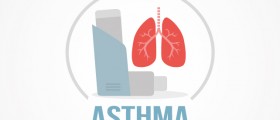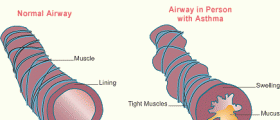Asthma is usually treated by inhalers of medicines used for prevention and to provide quick relief of symptoms. When these cannot be found or are not at hand, there are other useful ways of relieving immediate symptoms. These have to be discussed with the doctor in advance to exclude any possibilities of harmful effects.

Inhaler Alternatives
A good alternative for a relief inhaler is Primatene mist, which can be obtained in all pharmacies and it hasn't got any harmful effects. It is a good idea to call the pharmacy in advance and check if they have it in stock, not to make unnecessary trips and waste valuable time during a serious episode.
Caffeine can also be used for quick relief, especially because of its availability and presence in many drinks like Coca-Cola, Mountain Dew, and energy drinks if cups of coffee are not easy to find. If you combine the caffeine with a hot steam shower, you can maximize the results, or if you combine energy drinks with coffee, you can decrease the symptoms in up to 20 minutes. Asthmatics should always be close to a stock of these drinks to ensure that you can be in the clear if the symptoms get worse suddenly. If you do not find anything to drink containing caffeine, you can always get under a hot shower and steam for a while for a relaxing effect.
Taking fast-acting allergy medicines can also be effective, and these can be found anywhere: Benadryl, Sudafed, and Claritin. These medicines can even help out people whose asthma is caused by allergies but has not been diagnosed correctly. These medicines should be taken before the symptoms get worse, as antihistamines work best in the initial symptoms.
If none of these remedies works, you have to have a kind of a safety hotline and know who to call if you need to. It can be either friends or family members, or anyone who can take you to the ER when the attack is bad. Just talking to another person can provide a relaxing effect and reassure you that everything will be alright. As asthma can be fatal if not treated, and because the asthmatic person at the time of an attack cannot judge the situation properly, there must be another clearheaded person present.
Sharing your experiences with other asthmatics is also very helpful in finding good tips for relieving symptoms and having reliable support for your condition. You can even share your medication if there is a need, and you will always know someone who has the same medication as you.
- The pathophysiology of the disease is complex and heterogeneous, involving various host-environment interactions occurring at various scales, from genes to organ.
- Asthma is a chronic disease requiring ongoing and comprehensive treatment aimed to reduce the symptom burden (i.e. good symptom control while maintaining normal activity levels), and minimize the risk of adverse events such as exacerbations, fixed airflow limitation and treatment side effects.
- Asthma control medications reduce airway inflammation and help to prevent asthma symptoms; among these, inhaled corticosteroids (ICS) are the mainstay in the treatment of asthma, whereas quick-relief (reliever) or rescue medicines quickly ease symptoms that may arise acutely. Among these, short-acting beta-agonists (SABAs) rapidly reduce airway bronchoconstriction (causing relaxation of airway smooth muscles).
- Poor adherence to therapy is a major limitation of a treatment strategy based on the early introduction of the regular use of controller therapy. Indeed, a number of surveys have highlighted a common pattern in the use of inhaled medication, in which treatment is administered only when asthma symptoms occur; in the absence of symptoms, treatment is avoided as patients perceive it as unnecessary. When symptoms worsen, patients prefer to use reliever therapies, which may result in the overuse of SABAs. Indirect evidence suggests that the overuse of beta-agonists alone is associated with increased risk of death from asthma.
- Nearly a decade after the publication of the BEST study in 2007, the use of this alternative therapeutic strategy was addressed in the SYGMA 1 and SYGMA 2 trials. These double-blind, randomized, parallel-group, 52-week phase III trials evaluated the efficacy of as-needed use of combination formoterol (LABA) and the ICS budesonide as an anti-inflammatory reliever in patients requiring GINA Step 2 treatment, with the current reliever therapy (e.g. as-needed SABA) or with low-dose maintenance ICS (inhaled budesonide bid) plus as-needed SABA, administered as regular controller therapy.
- In real-world practice, mild asthma patients are treated with an as-needed SABA reliever or with daily low-dose ICS maintenance therapy plus a SABA reliever. In the Novel START study, 668 patients with mild asthma were randomized to receive either as-needed albuterol 100 µg, two inhalations (SABA reliever as a continuation of the Step 1 treatment according to the 2017 GINA guidelines), budesonide 200 µg (ICS maintenance treatment) plus as-needed albuterol (Step 2 therapy of the GINA 2017 guidelines), or 200 µg/6 µg budesonide/formoterol as anti-inflammatory reliever therapy taken as-needed for a 52-week study period.










,-Asthma-And-Anxiety_f_280x120.jpg)






Your thoughts on this
Loading...